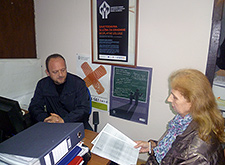Hope for the Hopeless - Citizens Advisory Service
06 November 2012, Novi PazarIn the summer of 2012, Mursel Bakić, formerly employed in the ‘Raška’ textile factory in Tutin, offered his kidney for sale to pay for electricity, feed his family and afford schooling of his children.
“I did not owe a smidgeon of the amount for electricity compared to what the State owed me, and they said they would cut if I didn’t pay. Me and my wife have been on unpaid leave since 1995 and although I have a court verdict that the factory should pay me more than four million dinars, my case ended ad acta”, Mursel said, adding: “My wife is sick, we do not have the right to welfare and we do not meet the requirements for retirement because of the contributions the factory did not pay... we struggle as much as we can - I dug trenches and worked on building sites.”
Alija Zulji is registered in the state statistics as an internally displaced person. He came from Prizren to Novi Pazar 12 years ago. Each time he needed personal documents he would go to Kruševac where registers from his hometown are kept.
“I leave Novi Pazar at 6 AM. I get off the bus in Kraljevo, and take a second bus to Kruševac. I usually get there during their break and then I wait. There are no (direct) buses to Novi Pazar before 4 PM, so then I get onto another bus in Kraljevo and get home around 7 PM. It takes me 13 hours to travel 240 kilometres. I have no income and every round trip costs at least three thousand dinars”, Zulji said. “Sometimes it happens that they spell my name wrong and then I have to hit the road again”.
Both Mursel and Alija are registered users of the Citizens Advisory Service (CAS) that has been operational in Novi Pazar since 2011, supported by the European Union and the Government of Switzerland through the European Partnership with Municipalities Programme EU PROGRES. The basic goal of the CAS is to provide free legal aid and advisory services to all town residents. Mursel gets help from the Service to launch court proceedings again, while Alija obtains his registry certificates through it.
“From the project’s beginning there were almost 300 users; 180 of them were successful in resolving their issues and those were mostly people who needed to obtain personal documents. However, many cases are ongoing; there are people who got hurt in conflicts between political parties, victims of discrimination and domestic violence… much more time is needed for them”, Semiha Kačar, director of the Sandžak Committee for Protection of Human Rights and Freedoms, that is implementing the project in partnership with the City of Novi Pazar, said.
Single parents, Roma, repatriates, unemployed, women, elderly, disabled, refugees and IDPs have priority in the Service, in the procedures of accessing rights with public services. In this way, services of the local self-government, employment institutions, social protection and healthcare, judiciary and police are brought closer to the users. Some categories of users also receive financial support to cover administrative fees.
“There are some unusual requests and emotional situations”, Semiha Kačar says. “The other day a plate of gurabije (local sweets) arrived at our door, brought by the husband and father-in-law of a young mother, IDP from Kosovo and Metohija, who could not get healthcare for months. We helped her and it happened that she went into labour as soon as she got her healthcare ID.”
Mursel Bakić, the man who has almost lost all hope, sees the light at the end of the dark tunnel of court proceedings. “This is the only service where one can turn without being humiliated or blackmailed. I do not know whether I will actually collect on the verdict, but the people in the Advisory Service restored my faith that things will get better.”




